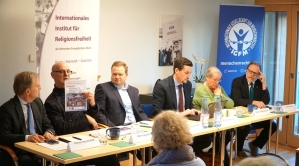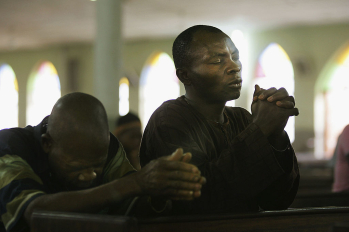
Religious freedom and human rights have not improved “in hardly any region of the world” in the past decade, with numbers of persecuted Christians steadily increasing, former World Evangelical Alliance Sec. Gen. and President of the International Institute for Religious Freedom, Archbishop and Professor Dr. Thomas Schirrmacher said on Thursday (Dec. 5).
Speaking at the launch of the “Religious Freedom 2024” and “Persecution and Discrimination of Christians 2024” yearbooks in Berlin, Germany, Schirrmacher said awareness of rights violations has grown with heightened research.
“We know much more today than we did 10 years ago and can record and neutrally analyze fates and facts worldwide,” Schirrmacher said. “The yearbooks and the new Violent Incidents Database of the International Institute for Religious Freedom document this in an up-to-date and diverse way. Politicians and the media can draw on this information.”
Also President of the International Society for Human Rights (ISHR), Schirrmacher is co-founder and co-editor of the yearbooks. Human rights experts at the event voiced concern about conflicts in the Middle East affecting Europe, especially Germany and Turkey; other “hotspots” cited were Africa, India and China.
Concerns about China repressing Christians, blasphemy laws in India and Islamic states, anti-conversion laws, and religious freedom issues in Russia were all becoming major threats to human freedoms, rights advocates said.
“Dictators learn from other dictators – they are afraid of religious freedom and human rights and are updating their methods to intimidate critics or cover up human rights violations,” said Martin Lessenthin, human rights expert and co-editor of the yearbooks. “Dossiers and blacklists on politicians and human rights defenders that publicize the fate of victims and other persecuted people seem to have become standard practice. Threats, criminalization and abuse of Interpol searches as well as entry bans are also part of the repertoire.”
Felix Böllmann, director of European advocacy at Alliance Defending Freedom (ADF) International, said many governments failed to uphold international laws guaranteeing religious freedom.
“In India, Pakistan and many South East Asian countries, draconian anti-conversion laws are routinely abused to target Christians,” Böllmann said. “Attacks and violence are often the result – whether by the state or by violent mobs.”
In Europe, “hate speech” laws are increasingly leading to restrictions on the expression of faith, according to Böllmann.
“Their deterrent effect favors self-censorship and silences people, with serious consequences for the social climate, religious communities and personal beliefs,” he said. “Christians are the most persecuted faith community in the world. ADF International advocates for justice for those who suffer persecution. At the same time, it is crucial that the international community does not accept violations of religious freedom, no matter where they occur.”
Kurdish Christians in Afrin, in northern Syria, have felt abandoned by the rest of the world, including states such as Germany that claim Judeo-Christian heritage, said Dr. Kamal Sido, Middle East consultant at the Society for Threatened Peoples.
“Around 1,200 of them still live in tents and celebrate their church services in a shack in no man’s land in northwest Syria, not far from Aleppo,” Sido said. “In 2018, they were forced to flee from the Turkish army and its Islamist mercenaries. Even in their tents, they are attacked almost daily by Turkey, including with combat drones.”
In Egypt, the situation for Christians remains “dire,” according to Lizzie Francis, legal counsel at ADF International, despite some unstated “positive developments.” She listed severe restrictions on freedom of speech, religious conversion and family life for religious minorities.
“The many attacks on Christian communities by Islamist extremists are not adequately responded to by law enforcement,” Francis said. “Egypt is thus becoming an increasingly hostile country for Christians who want to pass on their faith, or for Christian families who want to protect their daughters from forced marriages to older Muslim men.”
Everyone should have the right to live out their religious beliefs in freedom, without fear of reprisals from the state or exploitation by others in their communities, she said.
Coptic human rights activist and lawyer Tamer Hannah reinforced the point that conversion to Islam “only takes a few hours” in Egypt, signing a document and enjoying the protection of police and unspecified “Islamic groups.”
“In contrast, converting from Islam to Christianity is almost impossible,” Hannah said. “Even converted Muslims who want to return to Christianity face severe repercussions under Islamic law, including the threat of death as prescribed in their interpretation of the Koran.”
Frank Heinrich, chairman of the German Evangelical Alliance, said religion had been misused for political and geostrategic goals.
“Violence and hate crimes against Jews and Muslims are being more publicly recognized,” said Heinrich. “But there is also a growing number of hate crimes against Christians in Europe.”
Both yearbooks are published by the International Society for Human Rights (ISHR), the International Institute for Religious Freedom (IIRF) and religious freedom working groups of the three German-speaking alliances: the German Evangelical Alliance, the Swiss Evangelical Alliance and the Austrian Evangelical Alliance.
“Religious Freedom 2024” can be downloaded https://iirf.global/u/5441, and “Persecution and Discrimination of Christians 2024” at https://iirf.global/u/5450.





